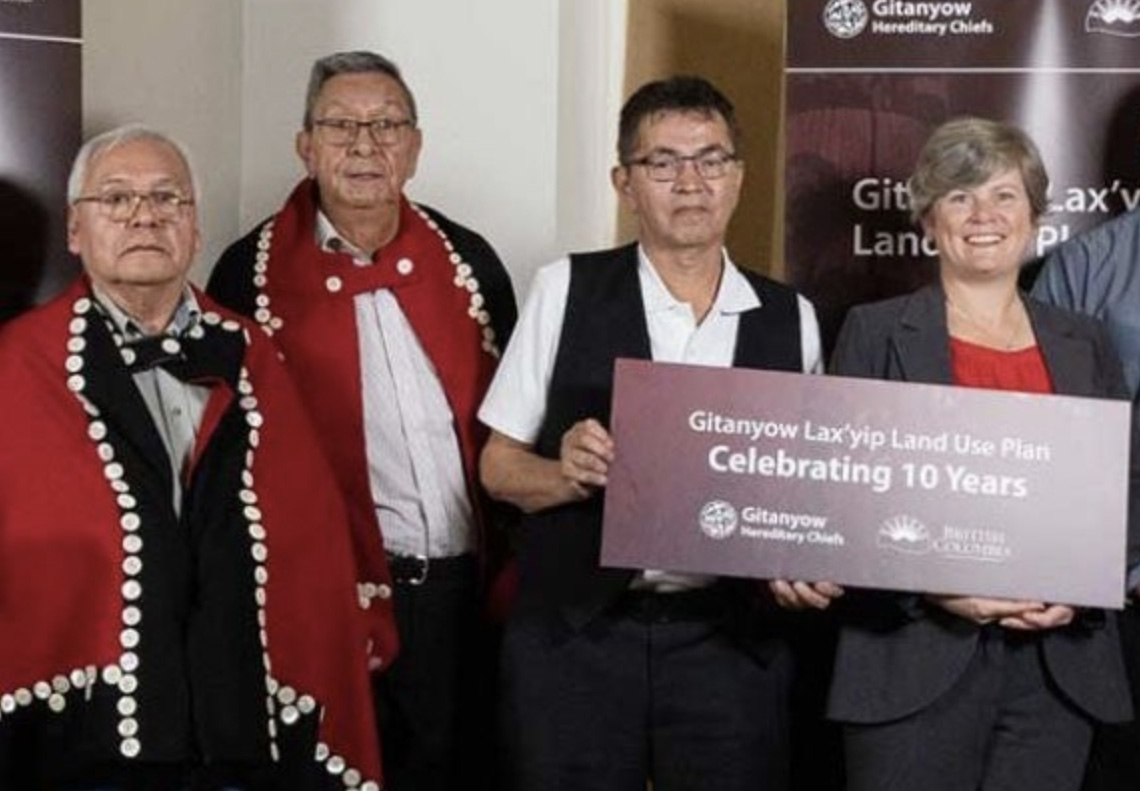Hereditary chiefs say mineral exploration activities that don’t have their consent must stop
Mineral exploration companies with claims and works in traditional Gitanyow territory north of Terrace will be banned from operating there, unless they get permission from the relevant house group, say Gitanyow heredity chiefs.
The Gitanyow, a sub-group of the Gitxsan Nation, have announced interim measures for dealing with mineral claims in their traditional territory, saying the provincial government has failed to properly address their concerns about consent.
Under the new measures, companies wishing to conduct mineral exploration must get the permission of the relevant whilp (house group).
“Effective August 14, 2024, all those without an active Access Agreement or other arrangement explicitly indicating consent of the relevant Wilp are required to cease and desist all mineral exploration and development operations within the Lax’yip and remove any related equipment and personnel,” the hereditary chiefs say in a press release.
“Free Miners must enter into an Access Agreement prior to registering new provincial mineral claims in the Lax’yip. Failure to do so will be considered by the Wilp as a factor in determining whether to enter into an Access Agreement.”
The decree will no doubt leave B.C. miners and exploration companies wondering if provincial laws no longer apply in B.C., as permits for mineral claims and exploration have historically been the purview of the provincial government.
Following the B.C. government’s implementation of the Declaration on the Rights of Indigenous Peoples (DRIPA), it’s becoming less clear which level of government has ultimate authority with respect to land use in unceded First Nation territories – the B.C. government or First Nations leaders.
The Gitanyow cite both DRIPA and the United Nations Declaration on the Rights of Indigenous Peoples (UNDRIP), and say they are implementing the new measures because the provincial government has failed to respond properly to their concerns about mineral claims and exploration in their territory getting approved without their consent.
The provincial government is the process of amending the Mineral Tenure Act to make it conform to DRIPA and its provisions for getting First Nation consent for resource development, but the Gitanyow chiefs say the government has not moved fast enough on interim measures to address Gitanyow concerns.
“The provincial government’s ongoing practice of granting mineral tenures and mineral exploration approvals without Gitanyow consent breaches the Ayookxw and infringes upon Gitanyow’s rights,” the chiefs say in their press release.
“Mining and Indigenous rights can co-exist, but not absent a robust consent-based planning tenure regime,” said Naxginkw-Tara Marsden, sustainability director for the Gitanyow hereditary chiefs.
“Where the provincial government fails, yet again, to create certainty for the mining industry, Gitanyow is acting in our Ayookxw to fill this gap.”
Asked to clarify whose laws are in effect, a spokesperson for the Ministry of Energy, Mines and Low Carbon Innovation wrote in an email to BIV:
- Laws allowing access to Crown land remain in effect;
- The province has not changed its tenuring process and will continue to recognize leases, licenses and permits currently in place for mineral exploration and other tenures in accordance with existing legislation, regulations, as well as applicable land use objectives;
- The province continues to consider its consultation obligations to First Nations as well as administrative fairness obligations to proponents, which require that statutory decision-makers review and make decisions with respect to applications in a timely fashion consistent with legislation;
- The Ministry of Energy, Mines and Low Carbon Innovation continues to recognize the rights of existing tenure-holders, including the ability to apply for Mines Act permits through a Notice of Work; and
- We remain committed to engaging with Gitanyow on any project-specific impacts during consultation on Mines Act applications.
Read the original article by Nelson Bennett at BIV.com.
